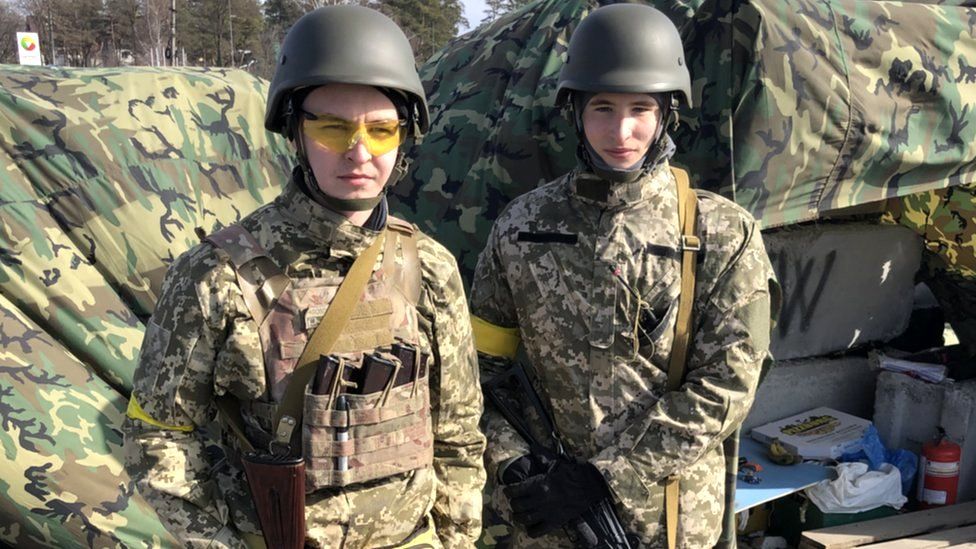Just over a week ago I met a group of young men who had volunteered at a centre in Kyiv to fight for Ukraine.
Most of them were in their late teens, not long out of school. They told me that after three days’ basic training they would head for the front line – or very close to it.
Maksym Lutsyk, a 19-year-old biology student, told me he wasn’t fazed about trying to become a soldier after less than a week of instruction. He’d manage, after five years in the Scouts, not just learning backwoods skills, but also some weapons training. He was 10 when Ukraine’s long war with separatists sponsored by Moscow started in 2014.
Maksym had gone to join up with his friend Dmytro Kisilenko, 18, who was studying economics at the same university.
The recruits were like any bunch of young lads who had decided they were no longer boys, laughing too loudly when someone told jokes to hide their nerves, or trying a bit of bravado.
Some of them were wearing knee pads that looked too small, as if they had come with skateboards on their 12th birthdays. A few had sleeping bags. One had a yoga mat. When they waited outside for the bus that was going to be taking them to the training base, they looked like friends on the way to a festival – apart from the guns. Each had been given custody of a Kalashnikov assault rifle.
Maksym (far left) and Dmytro (centre, with green jacket and white trainers) before their training
I’m in touch with Dmytro and Maksym and the other volunteers. This weekend I went to see them at their posts on the eastern edge of the city, where they have been issued with uniforms, body armour, proper infantry kneepads and helmets.
A bitter wind blew through the checkpoint which the volunteers were trying to turn into a real obstacle with sandbags and steel tank traps. They made the best of their very basic training.
Dmytro told me: “I got used to my gun. I learned how to shoot and how to act in the battle, also many other things that will be very crucial in the fight with the Russians.” He laughed, as if he found it hard to imagine what he was contemplating.
Maksym looked more urgent, more serious, less like a laid-back student.
“I feel much more confident than I was before, because we get enough knowledge in tactics, in martial arts, in tactical medicine and in how to do something on the battlefield.” Only half joking, he wanted to see the Ukrainian flag flying from the Kremlin.
The question on everyone’s mind here is whether the battle is coming for Kyiv.
“It’s definitely possible” said Dmytro. “We just have to stop them here, because if they get to Kyiv this war might be over.”
Barricades have been set up on roads in Kyiv using concrete blocks and “tank traps” from the city’s museum
They are from the same town near the Russian border, which is being shelled. Their families are still there. I asked the boys what their parents thought of what they were doing. Maksym joked that his mother had told him to stay in a shelter and volunteer to cook the food. He had spared them the details of his deployment because he didn’t want to worry them.
Dmytro’s parents knew what he was doing. He had started by volunteering to make Molotov cocktails and after a few days rang his dad to tell him he had decided to join the territorial defence force. His father told him not to try too hard to be a hero.
My parents, Dmytro said, are proud of what I’m doing. He looked delighted. I asked him if he felt scared of what is ahead.
“Not much, but it is human nature to feel scared, and of course deeply in my soul I feel a bit scared, as no one wants to die, even if it’s for your country. So, death is not an option for us.”
Dmytro and Maksym talked about their dreams for the future, fun with friends, finishing their studies, careers and eventually families. Their parents must be praying that their sons’ plans, energy and even their lives are not smashed by the brutal realities of war, like so many in all the other generations of young men who have joined up to fight in Europe’s wars.
Foreign journalists have no access to the young Russian men only a few miles away on the other side of the front line. Many are believed to be conscripts, who were not told properly what was being planned for them. Wars are mostly fought by young men.
I have no doubt that many young Russians in the war have hopes as high as Dmytro and Maksym. One difference might be less motivation to fight, though without the chance to report their side properly, it is hard to say with certainty.
The two young Ukrainian students-turned-soldiers went back to work on the checkpoint. The professional army is a couple of miles ahead, directly facing the Russians.
But if the Russians come, like all the volunteers, Maksym and Dmytro will be firing out of the trenches they helped dig into the surrounding ground, where boxes of Molotov cocktails are waiting – old bottles filled with petrol and pieces of grated polystyrene and stuffed with a rag to ignite what they hope might even disable a tank.
If that doesn’t work, the Nato military alliance is pouring in thousands of much more sophisticated anti-tank weapons.
Everyone here in Kyiv is waiting for what is likely to be the key battle of the war, soldiers, civilians in and out of uniform, along with Maksym and Dmytro and the other volunteers who are getting ready to fight with them.
Source: BBC News


